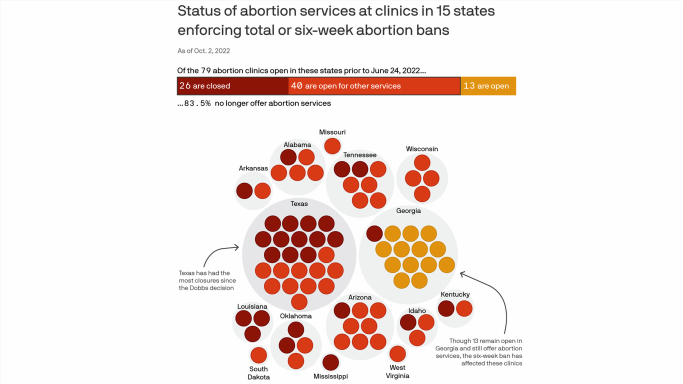

More than 80% of abortion clinics in 15 states with strict abortion bans have stopped offering the procedure in the 100 days since the Supreme Court overturned Roe v. Wade, according to a new report from the Guttmacher Institute, a research organization that support abortion rights.
Why it matters: The findings bear out predictions that access to the procedure would rapidly decline in conservative-led states after justices effectively ended all federal protections on abortion. Some clinics have moved operations to states where abortion access is protected.
By the numbers: Guttmacher examined 15 states — Alabama, Arkansas, Arizona, Georgia, Idaho, Kentucky, Louisiana, Mississippi, Missouri, Oklahoma, South Dakota, Tennessee, Texas, West Virginia and Wisconsin — that prior to the high court's June 24 decision had a total of 79 clinics.
As of Oct. 2, 100 days after the decision, only 13 are providing abortions.
- Of the 66 clinics that no longer offer abortion care, 40 are offering other health care services and 26 have completely shut down.
- There are approximately 22 million women of reproductive age in these 15 states, meaning nearly one-third (29%) of all U.S. women in that cohort are living in states where abortion is inaccessible, the report says.
State of play: Guttmacher researchers say that in the states where abortion is now unavailable, pregnant people seeking an abortion will need to travel out-of-state, self-manage their abortion using medication, or have to continue their pregnancy.
Zoom in: The 13 clinics that still provide abortions are all located in Georgia, where a six-week ban is in place.
- Texas had the most closures: Of the 23 clinics in operation before the decision, 12 shut down and 11 are open but only offering services other than abortion.
- In Wisconsin, an 1849 abortion ban that was preempted by Roe has not taken effect. However, health providers in the state facing legal uncertainty have stopped offering abortions, fearing possible prosecution.
What they're saying: “When clinics close down or stop offering abortion care, it represents a lost source of health care for their community," said Rachel Jones, a principal research scientist at the Guttmacher Institute.
- "More so, the loss of clinics is felt in all states — even those where abortion remains legal. Abortion clinics in these states are being inundated with people from states with abortion bans seeking care," Jones added.
Go deeper: Abortions have been increasing since 2017, new data shows
Source: Read Full Article
